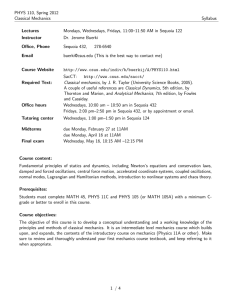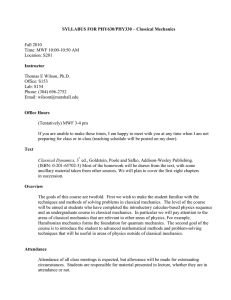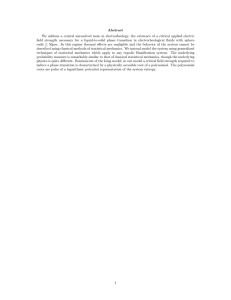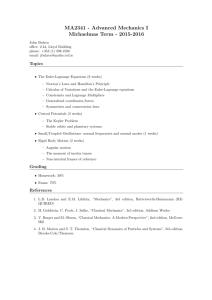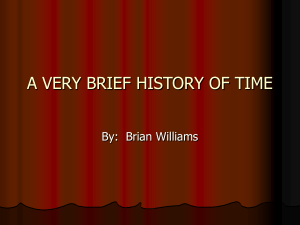PHYS 110, Spring 2013 Classical Mechanics Syllabus
advertisement
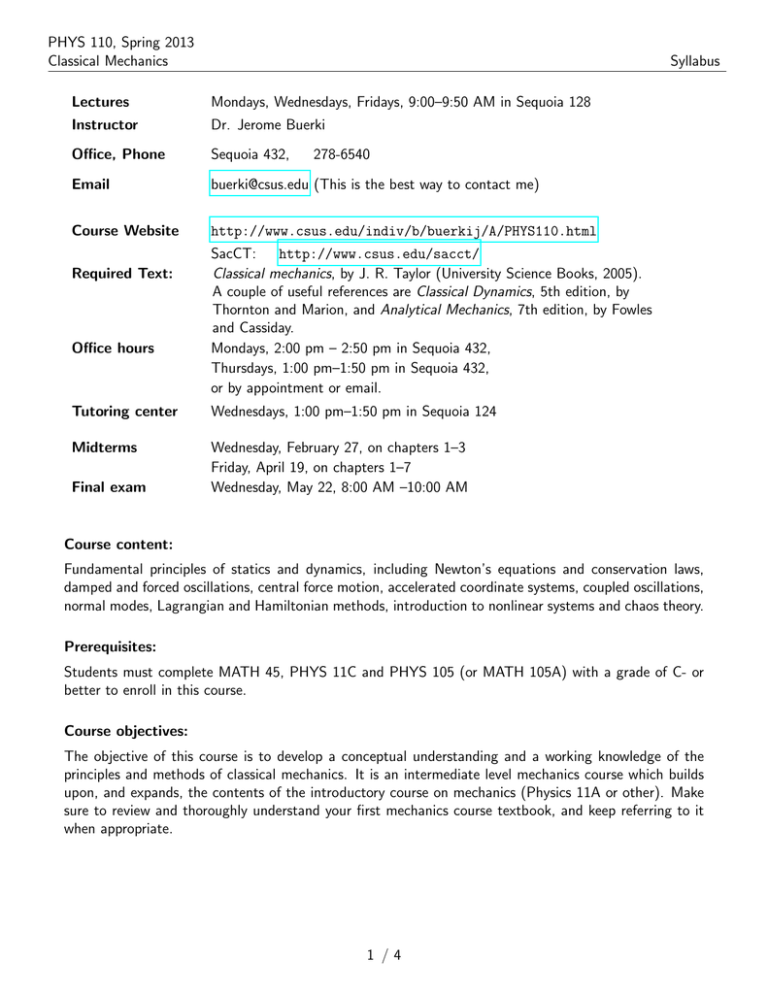
PHYS 110, Spring 2013 Classical Mechanics Syllabus Lectures Mondays, Wednesdays, Fridays, 9:00–9:50 AM in Sequoia 128 Instructor Dr. Jerome Buerki Office, Phone Sequoia 432, Email buerki@csus.edu (This is the best way to contact me) Course Website http://www.csus.edu/indiv/b/buerkij/A/PHYS110.html Required Text: Office hours 278-6540 SacCT: http://www.csus.edu/sacct/ Classical mechanics, by J. R. Taylor (University Science Books, 2005). A couple of useful references are Classical Dynamics, 5th edition, by Thornton and Marion, and Analytical Mechanics, 7th edition, by Fowles and Cassiday. Mondays, 2:00 pm – 2:50 pm in Sequoia 432, Thursdays, 1:00 pm–1:50 pm in Sequoia 432, or by appointment or email. Tutoring center Wednesdays, 1:00 pm–1:50 pm in Sequoia 124 Midterms Wednesday, February 27, on chapters 1–3 Friday, April 19, on chapters 1–7 Wednesday, May 22, 8:00 AM –10:00 AM Final exam Course content: Fundamental principles of statics and dynamics, including Newton’s equations and conservation laws, damped and forced oscillations, central force motion, accelerated coordinate systems, coupled oscillations, normal modes, Lagrangian and Hamiltonian methods, introduction to nonlinear systems and chaos theory. Prerequisites: Students must complete MATH 45, PHYS 11C and PHYS 105 (or MATH 105A) with a grade of C- or better to enroll in this course. Course objectives: The objective of this course is to develop a conceptual understanding and a working knowledge of the principles and methods of classical mechanics. It is an intermediate level mechanics course which builds upon, and expands, the contents of the introductory course on mechanics (Physics 11A or other). Make sure to review and thoroughly understand your first mechanics course textbook, and keep referring to it when appropriate. 1 /4 PHYS 110, Spring 2013 Classical Mechanics Syllabus Lectures: Lectures will be divided between formal lecture, discussion, example and problem solving. Attendance is not mandatory, but highly recommended. Homework: Homework will be assigned regularly, more or less on a weekly basis, to reinforce the material covered in class. Assignments will be made available online on SacCT. The due date will be indicated on the homework, and will usually be a week to ten days after it is made available. Solutions will be posted on SacCT after the due date is passed. Homework will be checked for “reasonableness,” i.e. you will get credit if it looks like you made a good faith effort to solve the problem, but I will not go into details for the corrections. It is up to you to check your work with the solutions. Late homework will be accepted for half credit if occasional and will not be accepted otherwise. Note that working through the examples in the textbook and on the homework problems and thoroughly understanding them is a major component of the learning process. Do not use solution manuals or any other source of solutions to the homework problems, as it is both dishonest and counterproductive. However, do not hesitate to ask questions about the homework, or study and work with friends or in groups. However, make sure that this serves the purpose of dealing with your misconceptions and gaining a full understanding of the matter at hand, and that the end product is your work. Needless to say, copying solutions (from any source), or letting your partner do the thinking while you do the writing, defeats the very purpose of the exercise and is not acceptable. You will only receive credit for your own work, based on your learning and understanding. Exams: There will be two midterm exams and one two-hour final exam. A typical exam will consist of a number of short-answer questions and a few longer problems to be worked out. Any subject matter covered in lectures and homework up to about a week before an exam may be included. The exact days and chapters covered in the one-hour exams will be announced at least one week in advance. If you have a conflicting activity that cannot be rescheduled, you must see me at least two days before the exam. If you don’t come see me before the exam, there will be no opportunity to make it up. You must bring me documentation of your conflicting activity. The final exam is two-hour long and is comprehensive, but will be somewhat weighted to the material covered after the last midterm exam. All exams are open book, and you are allowed a scientific calculator, but nothing may be programmed on it. I reserve the right to clear the memory of your calculator prior to or during the exams. No PDA or Phone based calculators are allowed. Use of cell phones and PDAs is prohibited during exams, and all rings must be muted! If you are expecting an important phone call, let me know before the beginning of the exam. 2 /4 PHYS 110, Spring 2013 Classical Mechanics Syllabus Grades: Credit for the various components of the course are as follows: Midterm 1 25 % Final exam 35 % Midterm 2 25 % Homework 15% Letter grades will be assigned approximately as follows: A B C D F 90–100 % 77–89 % 66–76 % 55–65 % 0–54 % However, I will take into consideration the distribution of scores prior to making a final decision. Academic Dishonesty Statement: The Department of Physics and Astronomy has unanimously approved the following statement: “The faculty of the Department of Physics and Astronomy will not tolerate academic dishonesty. Falsification of data, copying, unauthorized collaboration, plagiarism, alteration of graded materials, or other actions (as described in, but not necessarily limited to the Sacramento State Policy Manual) will be promptly reported to the Office of Student Affairs. The offending student will be penalized on the assignment in question. Serious infractions will result in course failure and a recommendation for administrative sanctions.” If you have any questions regarding this statement, please come and speak with me about it. Additional Information: If you have a disability and require accommodations, you need to provide disability documentation to SSWD, Lassen Hall 1008, 916-278-6955. Please discuss your accommodation needs with me after class or during my office hours early in the semester. 3 /4 PHYS 110, Spring 2013 Classical Mechanics Syllabus Approximate schedule Week Date Day Chapter Subject 1 Jan 28 M 1 Intro, Syllabus WF 1 Newton’s Laws of Motion M 1 WF 2 MW 2 F 3 2 3 Feb 4 Feb 11 4 Feb 18 MWF 3 5 Feb 25 M 4 Feb 27 W F 4 Mar 4 MWF 4 7 Mar 11 MWF 5 8 Mar 18 M 5 WF 6 Mar 25 Apr 1 Energy Oscillations Calculus of Variations Spring break M C. Chavez Birthday, no class W 6 F 7 10 Apr 8 MWF 7 11 Apr 15 M 7 W 8 Apr 19 F 12 Apr 22 MWF 8 13 Apr 29 MWF 9 14 May 6 MW 9 F 10 May 13 MWF 10 May 22 W 15 Momentum and Angular Momentum Midterm 1, ch. 1-3 6 9 Projectiles and Charges Particles Lagrange’s Equations Two-Body Central Force Problems Midterm 2, Ch. 1-7 Mechanics in Noninertial Frame Rotational Motion of Rigid Bodies Final exam from 8:00–10:00 AM 4 /4
